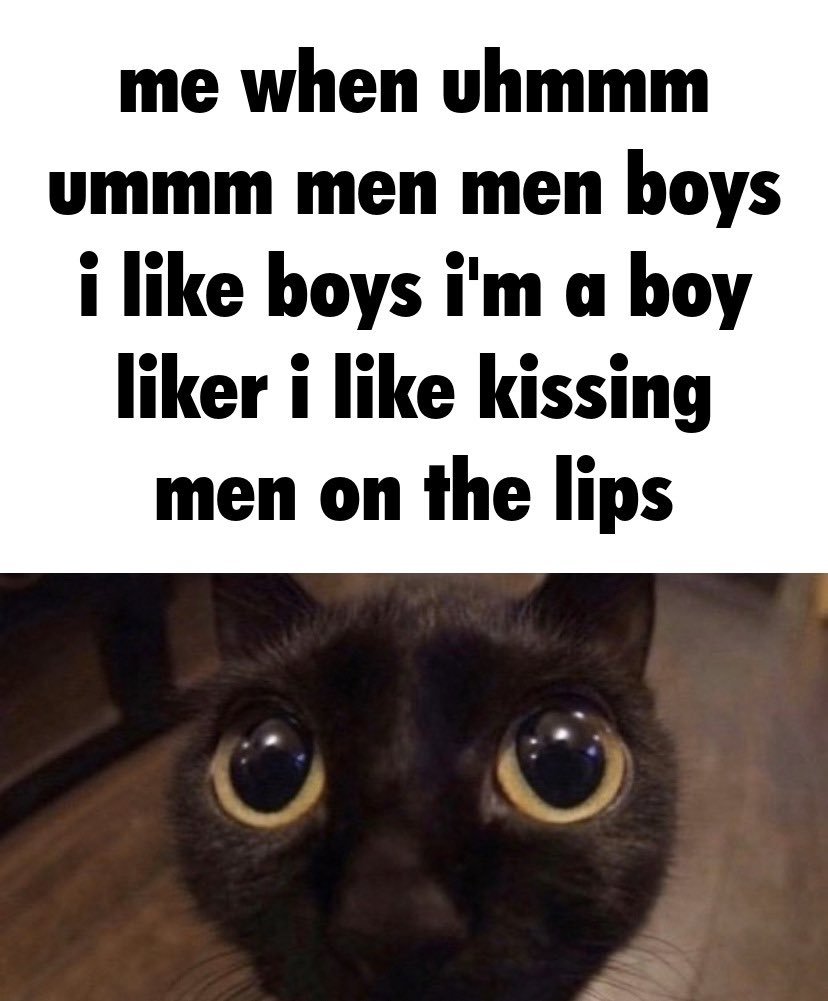"I Think I Like Boys" Meme: Origins, Impact & Future - Discover Now
Do you ever wonder how a simple phrase and an image can encapsulate a global cultural shift? Internet memes have transcended their origins as fleeting online jokes to become powerful tools of self-expression, community building, and societal commentary, and one of the most striking examples is the "I Think I Like Boys" meme. This seemingly simple meme has, for many, come to represent far more than just a passing trend; it's a symbol of identity exploration, a catalyst for conversation, and a reflection of our ever-evolving digital landscape.
At its core, the "I Think I Like Boys" meme is a humorous expression that also serves as a profound tool for self-reflection. It dives into universal experiences of uncertainty, curiosity, and personal growth, making it accessible to a broad audience. The meme's capacity to tap into these fundamental human experiences is a key element of its success. As we explore the meme further, we'll examine its roots, its cultural significance, and how it fits within the wider framework of internet humor. This analysis will offer a thorough exploration of this online phenomenon, its development, and its impact on modern society, whether you are a dedicated follower or just interested in how it all started. Let's begin!
| Category | Details |
|---|---|
| Meme Name | "I Think I Like Boys" |
| Origin | Tweeted in early 2020 |
| Core Concept | Self-discovery, exploring identity, and embracing uncertainty |
| Key Features | Simple, relatable captions; contemplative imagery; universal appeal |
| Platforms | Twitter, Instagram, TikTok, and various social media platforms |
| Cultural Impact | Promotes representation and inclusivity; encourages open dialogue about identity |
| Variants | Gender-neutral versions, career-focused, relationship-themed |
| Psychological Factors | Relatability, humor, cognitive processing, universal themes |
| Community | User-generated content, online discussions, shared experiences |
| Criticism | Concerns about oversimplification of complex issues and potential misuse |
| Responsible Usage | Sensitivity, respect, promoting open dialogue and understanding |
| Future Trends | Adaptation to new platforms and technologies; continued relevance in internet culture |
| Reference Link | Know Your Meme - I Think I Like Boys |
The genesis of the "I Think I Like Boys" meme can be traced back to a simple tweet posted in the early months of 2020. The post combined a relatable caption with an image of someone appearing thoughtful. This simple combination immediately clicked with viewers, igniting fast sharing and engagement across many platforms. The original tweet became popular because of its ability to capture the essence of self-discovery and personal development. The phrase "I think I like boys" functioned as shorthand for exploring one's identity and accepting uncertainty. As it spread, the meme spawned countless variations, each adding its unique spin on the original idea. The key elements of the original meme were its simple, relatable caption; its contemplative imagery; and its universal appeal. These characteristics helped the meme's widespread popularity, allowing it to resonate with a broad audience. Its adaptability across various settings and cultures cemented its position in the digital zeitgeist.
As the meme gained traction, it started popping up on sites such as Twitter, Instagram, and TikTok. Content creators embraced its versatility and humor, using it to explore a wide range of topics, from relationships to career choices. Each platform contributed its own twist to the meme: TikTok users integrated music and dance, while Twitter users focused on witty captions and clever wordplay. This adaptability kept the meme fresh and engaging, even as it reached new audiences. Social media analytics data indicates that the "I Think I Like Boys" meme has been shared millions of times on different platforms. The meme's popularity shows no signs of decreasing, as new versions continue to appear and attract users globally.
One of the most significant aspects of the "I Think I Like Boys" meme is its role in promoting representation and inclusivity. By addressing topics such as self-discovery and identity, the meme has created a space for open dialogue and understanding. Media sources have noted the meme's cultural significance, with articles and interviews exploring its impact on society. The meme has been praised for its ability to normalize conversations about identity and encourage individuals to embrace their true selves. The meme has also created a sense of community among its fans, with many users sharing their personal experiences and stories through the medium. This shared experience has created a supportive environment where individuals feel seen and heard.
As the meme continued to evolve, creators began experimenting with new formats and themes. These adaptations kept the meme relevant and engaging, ensuring its longevity in the digital space. Popular variants include gender-neutral versions, career-focused adaptations, and relationship-themed variations. These variants showcased the meme's adaptability and its ability to address a broad range of topics, from personal preferences to professional aspirations.
- Sweet Pea Puppy Bowl Your Guide To The Pawsome Event
- Unveiling The Power Of Curses History Modern Impact
Understanding the psychology behind memes can provide valuable insights into why certain ones resonate with audiences. The "I Think I Like Boys" meme taps into fundamental human experiences, making it particularly effective in capturing attention and sparking engagement. Relatability and humor are key factors in the meme's success. By addressing universal themes such as uncertainty and self-discovery, the meme creates a connection with its audience. The use of humor further enhances its appeal, making it more shareable and memorable. Research has shown that memes are processed differently in the brain compared to traditional forms of media. Their combination of visual and textual elements engages multiple cognitive processes, making them more likely to be remembered and shared.
Data from social media platforms highlights the meme's impressive reach and impact. With millions of shares and engagements, the "I Think I Like Boys" meme has become one of the most popular internet phenomena in recent years. Since its inception, the meme has experienced steady growth in popularity, with engagement metrics showing no signs of decline. This sustained interest indicates its enduring appeal and relevance in the digital landscape. Studies have shown that the meme resonates particularly well with younger audiences, who are more likely to engage with internet culture and participate in online discussions. This demographic alignment further explains its widespread adoption and success.
The meme's ability to spark conversations and foster community engagement has been a key factor in its success. Users from around the world have shared their thoughts and experiences, creating a rich tapestry of perspectives and insights. Many fans have contributed to the meme's growth by creating their own versions and interpretations. This user-generated content has added depth and diversity to the meme, allowing it to evolve and adapt to new contexts. Forums and social media groups dedicated to the meme serve as platforms for in-depth discussions and analysis. These spaces provide valuable opportunities for users to connect, share ideas, and learn from one another.
While the meme has received widespread praise for its positive impact, it has also faced criticism and controversy. Some critics argue that the meme oversimplifies complex issues, while others express concerns about its potential misuse. Proponents of the meme counter these criticisms by emphasizing its role in promoting open dialogue and understanding. They argue that the meme serves as a starting point for deeper conversations about identity and self-discovery. To ensure the meme's continued positive impact, it is important for users to approach it with sensitivity and respect. By using the meme responsibly, creators can help foster a supportive environment that encourages growth and understanding.
Looking ahead, the "I Think I Like Boys" meme is likely to continue evolving and adapting to new trends and contexts. Its ability to address universal themes and promote inclusivity ensures its relevance in the ever-changing digital landscape. As technology advances and new platforms emerge, the meme will undoubtedly find new ways to engage and captivate audiences. Its adaptability and versatility make it well-suited for the future of internet culture. The meme's long-term impact will depend on its ability to remain relevant and meaningful to its audience. By continuing to address important topics and promote positive change, the meme can maintain its place as a cultural touchstone for years to come.
- Cherie Deville The Step Mom Icons Rise Career Latest News
- Sweet Pea Puppy Bowl Your Guide To The Pawsome Event

Me When Uhmmm Ummm Men Men Boys I Like Boys I'm a Boy Liker I'm a Boy

I Like Boys // Animation Meme YouTube

Imgflip